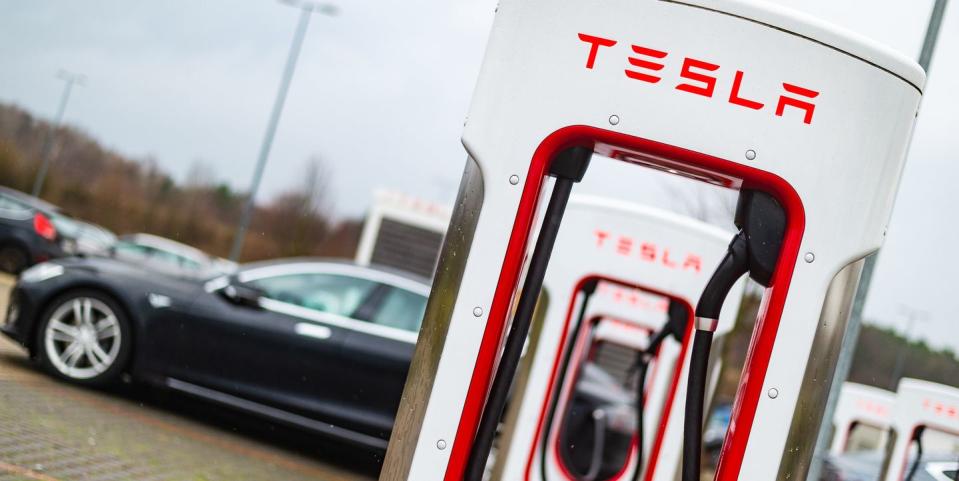Why Other Car Companies Don't Use Tesla Superchargers

Tesla has the best electric car charging network in the U.S. It's fast, reliable, and user-friendly, with tons of locations across the country (and the world). Uncertainty over charging needs, especially on long trips, keeps a lot of people away from buying an EV, and Tesla's easy, convenient charging network is a huge reason why people buy Elon Musk's cars. Tesla knows this, which is why, all the way back in 2014, the automaker announced that it was opening up its patents to allow competing automakers to design their EVs to use Tesla Supercharger stations.
So you may wonder why, nearly six years later, none of the established automakers are taking advantage of Tesla's offer. It all has to do with what Tesla put in the fine print.
In the 2014 blog post announcing the move—titled "All Our Patents Are Belong To You"—CEO Elon Musk claims to have made the decision "in the spirit of the open source movement, for the advancement of electric vehicle technology." That may be true, but that doesn't mean that use of Tesla's technology comes without cost. While Tesla offers to provide access to its patents free of charge, the announcement specifies that this applies to anyone acting "in good faith." It's a tiny phrase at the end of the second paragraph, but it's the key terminology that unlocks some very specific circumstances laid out in the fine print.
You won't find a definition of "good faith" in the announcement. For that, you'll have to go into the text of the Patent Pledge itself. There, you'll find this language:
A party is "acting in good faith" for so long as such party and its related or affiliated companies have not:
-asserted, helped others assert or had a financial stake in any assertion of (i) any patent or other intellectual property right against Tesla or (ii) any patent right against a third party for its use of technologies relating to electric vehicles or related equipment;
-asserted, helped others assert or had a financial stake in any assertion of (i) any patent or other intellectual property right against Tesla or (ii) any patent right against a third party for its use of technologies relating to electric vehicles or related equipment;
-challenged, helped others challenge, or had a financial stake in any challenge to any Tesla patent; or
-marketed or sold any knock-off product (e.g., a product created by imitating or copying the design or appearance of a Tesla product or which suggests an association with or endorsement by Tesla) or provided any material assistance to another party doing so.
I'm not a lawyer, but to my eye, there are some serious snags in this language, specifics that make using Tesla's patents untenable for most major corporations. To access Tesla's patents, it appears as though you not only forfeit your ability to assert patent claims over Tesla, but also your ability to defend your patents against any company using them to make electric vehicles. Nicholas Callura, an attorney from Duane Morris LLP, notes in a post on the law blog Lexology that the first bullet point has broader implications far beyond EV patents:
First, the Pledge states that those acting in good faith will not assert any patent or intellectual property right against Tesla. Note that a company using Tesla’s patented technology is not only giving up the ability to bring an action against Tesla for patent infringement, but any form of intellectual property infringement. This includes trademark and copyright infringement, as well as trade secret misappropriation. Thus, for example, if Tesla copied a company’s source code line-for-line, that company would be required to forfeit the protection provided by the Pledge in order to enforce its rights.
Callura also points out that having "financial stake in any challenge to any Tesla patent" could be broadly interpreted to include any firm an automaker partners with, including suppliers and joint ventures. So if General Motors chose to use Tesla's patented technology, and later, Honda sued Tesla over an entirely unrelated patent, GM's partnership with Honda could put it in violation of Tesla's "good faith" clause.
Would Tesla then choose to defend its patents, suing GM and forcing the company to abandon any products built with Tesla technology? The language of the agreement leaves that option open for Tesla.
Without an ironclad deal to secure rights to the patents in perpetuity, Tesla's "open patents" come with a lot of liability. An automaker basically has to agree to let Tesla have full access to all its intellectual property, whether it applies to EVs or something else. All of this to build EVs based on technology controlled by a competitor, to which access can be revoked. The way the agreement is written, the terms make it unpalatable to any automaker. Whether Tesla thought a major OEM would agree to the lopsided partnership, or whether the company simply publicized the decision as a way of boosting its own image, is impossible to say—Tesla reportedly no longer operates a public relations department, leaving us with nobody to contact to ask for comment.
You Might Also Like

 Yahoo Autos
Yahoo Autos 